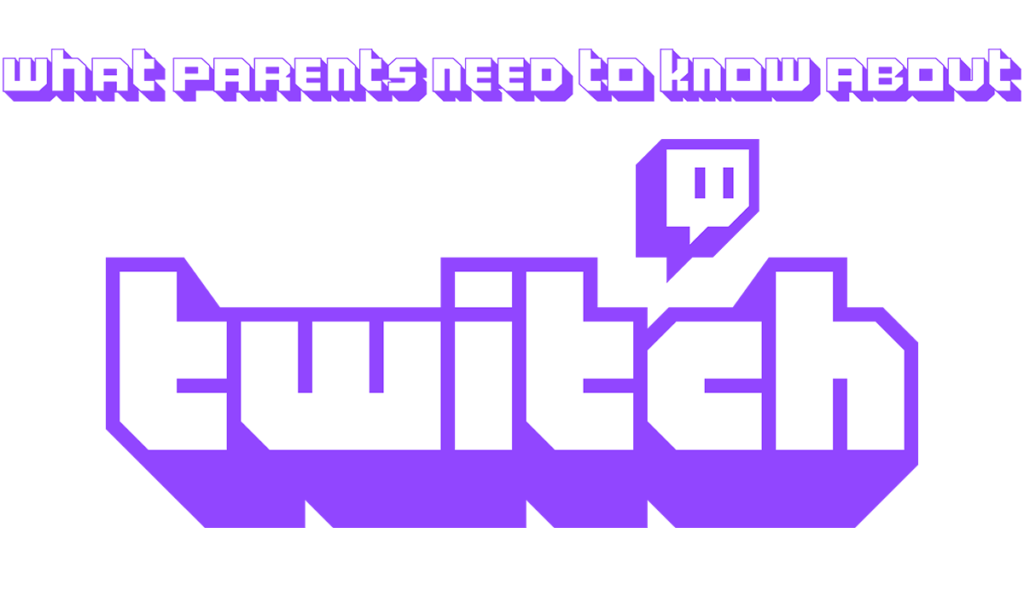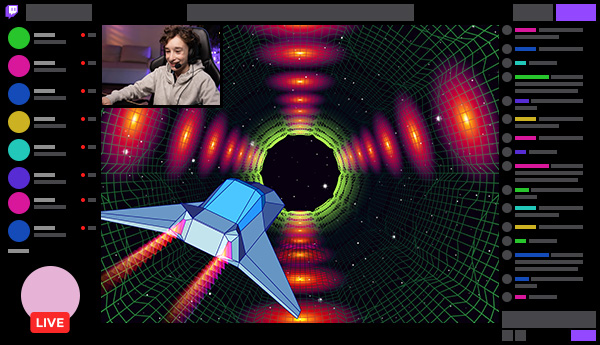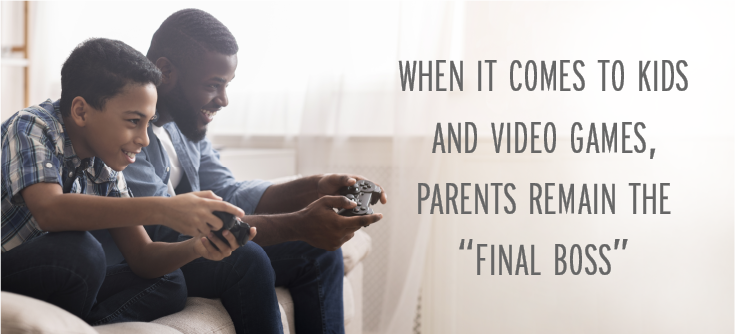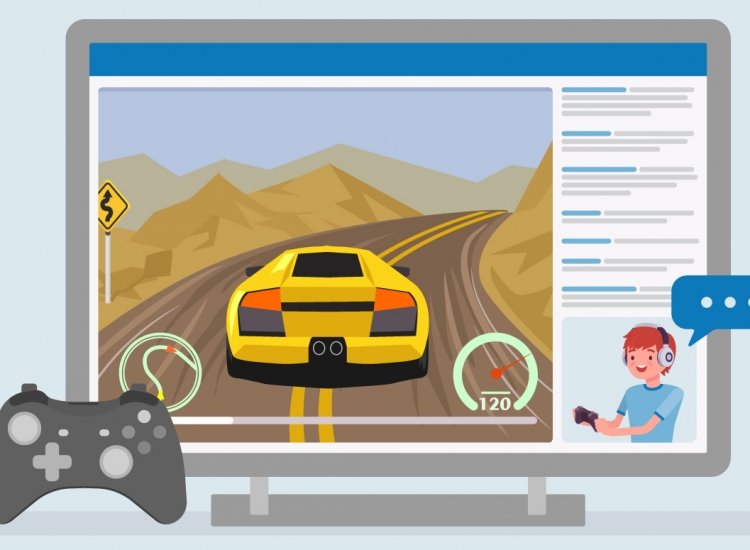What Parents Need to Know About Twitch

Updated 7/10/2024 – The age of web streaming is here to stay, and Twitch is leading the way with more than 140 million monthly active users on the platform. In fact, Twitch is one of the most popular destinations to watch streamers play through games, engage with their community, and more.
On Twitch, users can watch others livestream as they play games, providing commentary throughout. Coupled with a robust chat system that allows streamers to interact directly with those watching, Twitch can be a magnetic platform for gamers of all ages. Gamers frequently visit Twitch to watch their favorite games being played, chat with other fans, and discuss events in real time. If your kids love games, odds are they have shown an interest in Twitch, and you’ll want to make sure they know how to use the platform safely and appropriately.
What Is Twitch?
From the platform’s website, “Twitch is where millions of people come together live every day to chat, interact, and make their own entertainment together.” Using Twitch, streamers (creators that record and post videos of game play live) entertain their followers with the latest games and gameplay videos. If you’re not familiar, think of it like YouTube, but the content is live (and in some cases archived), as opposed to prerecorded.
More recently, Twitch has grown beyond video games and now hosts streamers for other topics, from politics to travel and even cooking. For example, the most popular non-gaming topic is “Just Chatting”, where streamers will speak with their audience through chat or other voice services (like Discord).
Can My Kids Communicate with Others via Twitch?
Twitch is, at its core, a social platform. Streamers can DM (direct message) fans, and fans can interact with each other via the built-in chat function. Your kids can also “follow” their favorite streamers. This is similar to how you would follow anyone on a social platform: The streamer will show up in your kids’ feed as they go live (i.e., starts a livestream) and, in some cases, your kids may receive a notification to let them know someone they follow is active. Many popular streamers make their own community guidelines for live chats in their streams and hire/choose “chat moderators” to discipline users that are behaving inappropriately.
Users can obtain “Channel Points”, which can be used for streamer-specific actions (such as highlighting their chat message during a stream or even asking the streamer to do a certain action like picking their background music). Channel Points are earned by watching the stream for a certain amount of time, chatting every so often, and purchasing subscriptions during the stream’s duration (more on this later).
Some streamers also cultivate heavily moderated chats that promote safety, but unsolicited private messages can still occur in this space.
Does Twitch Cost Money?
Twitch is free, but there are options to spend money. While many streams are ad-supported, streamers often accept donations from their community, enabling some creators to make Twitch their full-time job.
There are a few functions that may require users to pay for access. For Twitch partners and affiliates (i.e., streamers with a sizable audience and approved through Twitch’s vetting process), users can purchase subscriptions, and streamers will take a portion of those profits. Some streamers also enable donation tools like Streamlabs, Patreon, Kofi, and PayPal, where users can send money to their favorite personalities – almost like a tip jar.
Some streamers also cultivate heavily moderated chats that promote safety, but unsolicited private messages can still occur
For those that have Amazon Prime, there are also free bonuses, such as a free monthly subscription to a Twitch streamer and perks for certain games – which change monthly. This can include in-game items and sometimes even free games. (Twitch is owned by Amazon.) This requires that your kids’ Twitch account be linked to an Amazon Prime account.
Twitch does not have any built-in parental controls for spending so it’s important to discuss spending limits with your kids and enforce household rules about how much, if any, money can be spent. Also, if you don’t want any money spent, make sure you don’t save any credit card information to your kids’ account.
Is There Inappropriate Content on Twitch?
Like many social platforms, there can be inappropriate content on Twitch that’s entirely unrelated to video games. Strictly adult content, such as anything explicitly sexual, is not allowed according to Twitch’s terms of service. However, as a variety of games can be streamed on Twitch, including games that are rated M for Mature, your kids could encounter content that you may consider inappropriate. Note that Twitch prohibits streams for games rated AO (Adults Only).
Fortunately, Twitch streamers can flag their streams with “Content Classification Labels” (CCLs). These labels act as a heads up to viewers and parents about the content of the stream and have the added benefit of helping parents manage what their kids have access to. This includes mandatory labels for streams incorporating:
- Mature-rated games
- Sexual Themes
- Drugs
- Intoxication
- Excessive Tobacco Use
- Violent and Graphic Depictions
- Significant Profanity or Vulgarity
- Gambling
While many of these labels must be toggled manually by the creator, Twitch will automatically label the stream of a game rated M for Mature to let parents and consumers know. To reiterate, streamers are required to label their streams if they contain the above content, but Twitch will do it for them if they fail to. For more on these requirements, visit Twitch’s CCL guide.
Beyond the automatic CCL for Mature-rated games, streamers are not required to display ESRB ratings for the games they stream. So, this is another reason to talk to your kids about who your kids are watching on Twitch, what their favorite streamers are playing, and more. No one knows your kids better than you, so it’s always a good idea to check out your kids’ favorite streamers to see how they behave.
You may also find that streamers run the gamut of appropriateness, just like the games they decide to stream. Even if a streamer is playing a game rated E for Everyone, that does not mean that the streamer’s behavior is equally appropriate. This isn’t automatically a bad thing, but it is something to be aware of as you decide what’s appropriate for your kids.
there can be inappropriate content on Twitch that’s entirely unrelated to video games
For example, some streamers may use strong language that some parents may find objectionable, while others may dress suggestively. Some streamers may choose to discuss topics that reach beyond your kids’ maturity or level of understanding (politics, current events, etc.). None of these immediately or automatically breach Twitch’s community guidelines, but it’s a fine line, and you should be the one to decide what your kids are ready to experience. This is further outlined in Twitch’s CCL guide and in the community guidelines.
Just like other forms of entertainment, Twitch offers something for just about everyone. It’s exciting to have so much varied entertainment at your fingertips, but sometimes it takes some research to decide if a particular streamer is appropriate for your kids.
How to Manage My Kids’ Twitch Activity?
Twitch does not have the kind of parental controls you can expect from video game consoles and other devices, but there are some built-in measures you can take to help manage what your kids are exposed to.
First and foremost, when signing up for an account make sure your kids enter their birthday accurately… and this tip goes for all online services your kids are interested in. This is monumentally important, especially for children under the age of 13, who are afforded numerous protections under the law about the kind of information that can be collected from them. In fact, according to Twitch’s Terms of Service, children 13 or older are allowed to create an account, but only under parental supervision. And children under the age of 13 are not allowed to create an account on Twitch at all, according to its terms of service. Should a child under the age of 13 manage to create an account, parents can email Twitch to have the account and all associated information permanently deleted after providing relevant information to confirm that their child has breached the terms of service.
important, especially for children under the age of 13, who are afforded numerous protections under the law about the kind of information that can be collected from them. In fact, according to Twitch’s Terms of Service, children 13 or older are allowed to create an account, but only under parental supervision. And children under the age of 13 are not allowed to create an account on Twitch at all, according to its terms of service. Should a child under the age of 13 manage to create an account, parents can email Twitch to have the account and all associated information permanently deleted after providing relevant information to confirm that their child has breached the terms of service.
If your kids are under 18-years-old, streams labeled with Sexual Themes; Drugs, Intoxication, or Excessive Tobacco Use; Violent and Graphic Depictions; and Gambling will be filtered out by default. However, if your kids are allowed to follow a streamer with one or many of the hidden or blurred CCLs active, they will continue to show up.
You can also block or limit which streams your kids have access to based on the CCLs a streamer activates. Via the Content Display Preference section of the Profile, you can hide content labeled with CCLs that your kids may not be ready for. According to Twitch, these streams will not be recommended to your kids and will not show up as they search for content. There is also an option to blur previews and thumbnails for videos with a Sexual Themes CCL.
As previously mentioned, the chat in any given stream can be somewhat of a wildcard. Streamers cannot always control everything their followers or viewers say, even with dedicated moderators. Twitch does not offer the ability to disable chat during streams, so you can assume that your kids will have some exposure to other users – be it active or passive. However, there are options to “hide chat” for personal interactions, which means that other users cannot directly contact your kids. If that function is not activated strangers can “Whisper” (i.e., private direct message) your kids. You and your kids can block Whispers from anyone that they do not follow or subscribe to. This effectively makes it hard for strangers to reach out to your kids. But if your kids are following or subscribed to someone, that person will be able to Whisper to them.
Twitch also offers the ability to create customizable “chat filters” which can be used to block potentially inappropriate language across any channel your kids want to watch. You can enable them in your “Security & Privacy Settings.”
Streamers cannot always control everything their followers or viewers say, even with dedicated moderators.
Note though, that none of these measures are parental controls, and they are not password or PIN protected like they would be on a video game console or platform. This means your kids can technically roll back these settings without your permission, so it may be helpful to explain to them why these settings are so important and to make it part of your household rules.
Fortunately, Twitch regularly adds new safety and customization options to help make sure no one is surprised when browsing for a new stream to watch.
What If My Child Doesn’t Have an Account or Isn’t Logged In?
Twitch streams can be watched without an account. If you’re not logged in, you cannot participate in chat, but chat is still visible, meaning potentially mature conversations in a chat will appear. However, content labeled with Sexual Themes and/or Gambling will automatically be filtered out if you’re not logged in. It may be tempting to simply not make an account for your kids, but logged-in users have much more control over what they see and can turn off the direct message function entirely, as well as block or report users that are behaving inappropriately.
Talking to Your Kids About Twitch
At this point we’ve mentioned it several times, but the most powerful tool in your parenting tool belt is establishing ongoing and open dialogue with your kids about all of the content they consume online – including Twitch streams. It’s important to know who your kids’ favorite streamers are and why, so you can gain a better understanding of what your kids may experience.
With this information you can take some time to watch streams yourself to see why your kids are drawn to these personalities. In some cases, you may find that the content created by your kids’ favorite personalities are not quite appropriate, leaving the door open to explaining what is and is not permitted, and why. However, it’s just as likely that you’re entertained by it, too… and it may even turn into something you can enjoy as a family or motivate you to try playing the game being streamed!
 Patricia E. Vance is the president of the Entertainment Software Rating Board (ESRB). In her position, she leads the teams responsible for assigning age and content ratings to video games and apps, enforcing marketing guidelines adopted by the video game industry, and operating ESRB Privacy Certified, an FTC-approved COPPA Safe Harbor Privacy seal certification program.
Patricia E. Vance is the president of the Entertainment Software Rating Board (ESRB). In her position, she leads the teams responsible for assigning age and content ratings to video games and apps, enforcing marketing guidelines adopted by the video game industry, and operating ESRB Privacy Certified, an FTC-approved COPPA Safe Harbor Privacy seal certification program.




